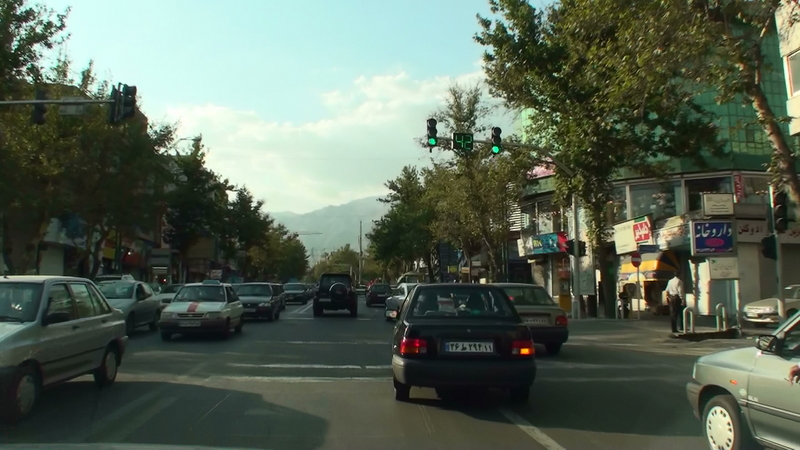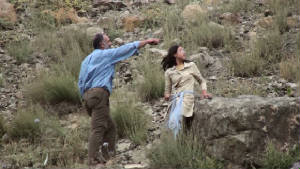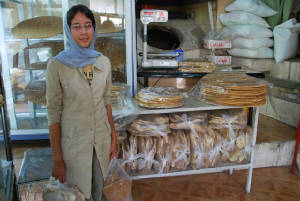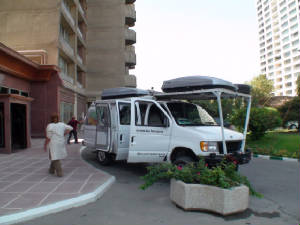TEHRAN & VICINITY
By Kambiz Taleghani
20081004
Entered Tehran from the East at dawn on Friday
August 1st.
 Tehran is a vast City of 12 million. It sits on sloping terrain between 5000-8000 feet elevation (1600-2700 meters).
The air is polluted. Many high-rises. Suffers from almost permantent traffic jam during business hours.
It took us well over an hour to drive from the edge of town to its North, using one of its many highways.
Tehran is a vast City of 12 million. It sits on sloping terrain between 5000-8000 feet elevation (1600-2700 meters).
The air is polluted. Many high-rises. Suffers from almost permantent traffic jam during business hours.
It took us well over an hour to drive from the edge of town to its North, using one of its many highways.



Stayed at the apartment of a colleague we had met many years ago in
the U.S. He had moved to Iran with his family during the early 90s. The family has moved back to the
U.S. When he heard we have entered Iran and are headed to Tehran, he insisted we stay at his place. He was very
kind and put his entire furnished apartment at our disposal. Thank goodness for that, because, as I learned later, all
the hotels were full during the few days we were in Tehran. So very kind of him.
The next day, Saturday morning, I hired a taxi and headed for Tajikistan embassy to get a visa. Unfortunately
that was not in the cards. Tajik consul could not issue visas in time for us. That caused us to cancel our
goal of driving to Kazakhstan and began driving Westward in search of a port to send the car back home. For details
of this story, Click here or see the "Aborted Drive" tab of this website.

Tehran,
a city of Contrasts. Picture of a luxury residence, (picture is from the Internet).
 A street scene from North of Tehran. Taken at 7:00 a.m.
on a weekend. On non-weekend days, there is a permanent traffic jam on this and most other city streets.
A street scene from North of Tehran. Taken at 7:00 a.m.
on a weekend. On non-weekend days, there is a permanent traffic jam on this and most other city streets.
While waiting at
the Tajikistan embassy, I met an Afghani and a Tajik university student. They were studying in one of the universities
in Tehran. Iran, Afghanistan, parts of Pakistan, Tajikistan, and parts of Uzbekistan share the same language - Persian.
So, for them studying at Iranian Universities does not involve learning another language. Very polite, well-mannered, well-dressed,
and articulate students. A far cry from the stereotypical people we see on the news with robes, turbans, and beards.
I talked to both briefly. They were from educated and well-off families. The Tajik student was from Dushanbe.
The Afghan was from Mazaar-e-Shariff. They were classmates and friends. The Tajik student was married. He
and his wife had recently had a child. He was there to get a Tajik birth certificate for his new-born child.
 That afternoon we headed for the main cemetery of Tehran where my (i.e. Kambiz') grandmothers are buried.
Leila insisted she wanted to visit her great grandmothers' gravesites. On the way, we passed by a HUGE complex
of mosques and blue-tiled buildings. The taxi driver said that is where Ayatollah Khomeini is buried. Khomeini
was a religious cleric and teacher who reached the ultimate position of Grand Ayatollah. That is the highest religious
level one can reach. He was in exile in Iraq for many years, then moved to Paris. Eventually when
the revolution happened, the Shah moved out and Grand Ayatollah Khomeini moved in from Paris. In 1980 he ended
almost 3000 years of Monarchy and created a new type of government called Islamic Republic.
That afternoon we headed for the main cemetery of Tehran where my (i.e. Kambiz') grandmothers are buried.
Leila insisted she wanted to visit her great grandmothers' gravesites. On the way, we passed by a HUGE complex
of mosques and blue-tiled buildings. The taxi driver said that is where Ayatollah Khomeini is buried. Khomeini
was a religious cleric and teacher who reached the ultimate position of Grand Ayatollah. That is the highest religious
level one can reach. He was in exile in Iraq for many years, then moved to Paris. Eventually when
the revolution happened, the Shah moved out and Grand Ayatollah Khomeini moved in from Paris. In 1980 he ended
almost 3000 years of Monarchy and created a new type of government called Islamic Republic.


Resting place of the great grandmothers.
(maternal, left. paternal, right)
On the way
back from visiting Leila's great grandmothers' gravesites, we stopped at a jewelers' bazaar. Very interesting.
Nothing but jewelry stores, one after another. Very interesting locally-designed and built jewelry. Mostly
24 carat gold. They sell the jewelry by weight. As if the workmanship has no value! We
looked at some. There was one bracelet, so beautiful. The price was $600USD. Something like that,
if you can find it, would cost 4-5 times more in Western Europe or North America. I wish we had bought it.
It was a piece of art. The design and workmanship was magnificent. We have since regretted not having bought
it.
Tehran is a crowded city with many high-rise buildings.
There was shortage of water, electricity, and fuel when we were there (August 2008). Electricity would go out
around the city on a rotating basis. Near our building the electricity was cut-off between noon and 2:00 p.m.
every day. If you live in a high-rise, you become dependent your own emergency power generators to operate the
elevators, water pumps, etc. -- every day. The generators are diesel-powered. There was a shortage
of diesel fuel. ... and so on.
Monumental traffic
jams despite many highways and cloverleaf interchanges build in the city.
 There is a metro which looks modern. Many people take taxis and metro simply because there is no parking space
available in the city. Apparently the municipality issued building permits for multi-story and high-rise apartment buildings
without parking space. By the time the codes and anti-corruption caught on, it was too late. Even if you drive
late at night, depending on your destination, you may not find a parking space when you arrive.
There is a metro which looks modern. Many people take taxis and metro simply because there is no parking space
available in the city. Apparently the municipality issued building permits for multi-story and high-rise apartment buildings
without parking space. By the time the codes and anti-corruption caught on, it was too late. Even if you drive
late at night, depending on your destination, you may not find a parking space when you arrive.
We went to a handicraft store and bought a nice backgammon and chess set.
The last day in Tehran we drove through some mountain
valleys to try fishing in a few snow-melt streams.  The first river and its banks were so polluted. Strewn with refuse and trash. Nothing but discarded plastic
bottles and containers floating on the water. In some eddies, you could not see the water from the congestion of debris
floating on it. Many discarded tyres, auto parts in the riverbed, etc. On the banks, again discarded used diapers,
and every other piece of trash you can imagine. This river was once known for its trout fishing. That was
about 30 years ago. We saw no public facilities including toilets. Every weekend, many thousands of visitors
come here and have to relieve themselves on or near the banks of the stream. Truly an environmental disaster.
I know some Iranians will eventually read these lines. We hope there will be enough similar environmental
concerns to cause remedial action. Maybe this is simplistic thinking. But, hey, why not mention it.
Maybe it will do some good. The river is called "jaajrood".
The first river and its banks were so polluted. Strewn with refuse and trash. Nothing but discarded plastic
bottles and containers floating on the water. In some eddies, you could not see the water from the congestion of debris
floating on it. Many discarded tyres, auto parts in the riverbed, etc. On the banks, again discarded used diapers,
and every other piece of trash you can imagine. This river was once known for its trout fishing. That was
about 30 years ago. We saw no public facilities including toilets. Every weekend, many thousands of visitors
come here and have to relieve themselves on or near the banks of the stream. Truly an environmental disaster.
I know some Iranians will eventually read these lines. We hope there will be enough similar environmental
concerns to cause remedial action. Maybe this is simplistic thinking. But, hey, why not mention it.
Maybe it will do some good. The river is called "jaajrood".
Continued
into the mountains and passed three ski resorts. Shemshak, Gajereh, (forgot the name of the third one), Beautiful.
They are building many high-rises at these ski resorts. Reminds me of some French mountain resorts. Looks very
similar.
.
.
.
.

Had
to take a very interesting switch-back road down from a high pass to the next valley's floor.


The mountains were majestic. These pictures don't do the scenery much
justice. Leila and Kambiz climbed the slope between two switchbacks to reach a freshwater spring.
The picture, below left, somwhat depicts the scale. See how the two of them are dwarfed by the
mountain. This was a small section of the middle of a slope. Good skiing in winter!



We stopped by two other rivers and tried trout-fishing with
spinners. No luck.


.



Stopped at a village, and bought fresh-baked local bread and some absolutely delicious
Persian melons





Eventually
we returned via a dammed lake on which Kambiz water skied as a child. All boating and water skiing is now prohibited
on the lake. The reason given is that these activities pollute the water which is piped to the city. The lake is approximately
20 mile (32Km) long. Never mind that the water, after leaving the lake, goes through 20 miles (32km) of polluting establishments
on both sides of the river before it reaches the intakes which take the water to Tehran. Nice weather. Beautiful
scenery.
Our last night in Tehran we went to an area called Darband for dinner. It is at the extreme north of Tehran.
By the way, north of Tehran is over 7000 feet (2300 meters) in elevation. In August, in the heat of summer, you have
to take a sweater with you. Saw two very unusual restaurants next to a creek which runs at the bottom of the valley.
On the rock face, there is a steep slope, very steep. An enterprising mind has built a restaurant whose balconies are
like the hanging gardens of Babylon. I have one picture, but because it was taken at night, it is bad quality and does
not show the setup well. The guests have to walk up a very steep stairs to reach each "balcony".
The balconies are built into the mountainside. There is no building. The "building" is the mountain!
We ate at a restaurant whose cubicles and tables were set on terraced gardens. Very tastefully arranged and decorated.
Excellent food as well.
 The next day we left Tehran and drove west toward Tabriz on our way to Georgia.
The next day we left Tehran and drove west toward Tabriz on our way to Georgia.
After 2-3 days of trying, I had found a shipping agent in the Georgian port of Poti, and booked a container to ship
our car back to Los Angeles.
Click here to see the Story of our Aborted Drive and eventual flying into China.